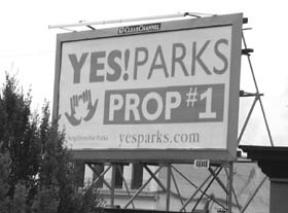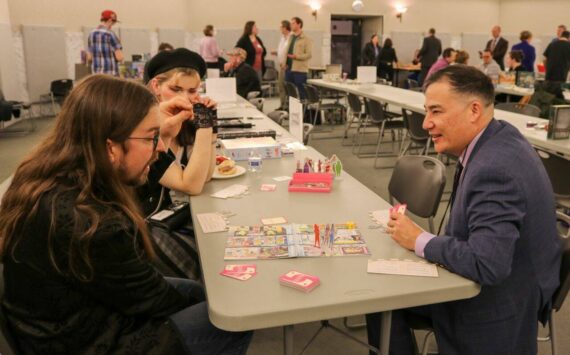Didnt we vote a few years ago to give them a bunch of money?
That was the exasperated comment overheard yesterday morning, while standing on line at a coffee shop on Pacific Ave. The customer in front of me was scanning Mondays News Tribune, which featured a front-page story about Metro Parks Departments $4 million budget gap. He was shaking his head in frustration and disgust.
The plan? Close Manitou Community Center, the Titlow Pool, and 10 wading pools; cease maintenance on a citywide range of basketball and tennis courts and playground equipment at 16 parks; and end the dog patrols that have kept Canada geese (and, more important, their droppings) off the grass near Point Defiance Park and Ruston Way.
The department hosted the first in a series of public hearings last night.
A $60 million proposition presented to voters on Nov. 2 did not receive the required voter approval (58.4% voted for the bond, 41.6% voted against; a 60% majority was necessary for approval). The bond would have provided funds for improvements to neighborhood parks, playgrounds, community centers and athletic complexes throughout Tacoma.
Metro Parks is now trying to balance its books and provide services without those funds.
Confusion and frustration. These are two feelings that Metro Parks and Tacoma residents share.
The department is confused as to why voters would not approve a measure to save city parks. The department is frustrated that it has to consider park closures and service cutbacks.
Voters (like the coffee shop customer) are confused because they thought they already rasied taxes for parks four years ago. In 2000, voters permanently increased the county sales tax, raising $90 million over the next decade for parks. Electing not to pass this years proposition made sense to many voters: Why not? We already pitched in for parks.
Voters are frustrated because they already face heavy tax burdens. Washington state has the ninth highest per capita tax rate in America, Pierce County has the highest sales tax in Washington state, and Tacomas property tax rate is the highest in Washington state.
Metro Parks president Aaron Pointer told the News Tribune, Its just a darn shame that 41 percent of the people can determine our direction for the next few years. Maybe if wed have waved a few more signs and rung a few more doorbells and talked to a few more people we would have gotten the other 1.6 percent.
Actually, its a darn shame that Metro Parks didnt address the real issue: it has an image problem with voters.
First, voters dont view city parks the way the department views city parks Its nice to think that funding city parks is the right thing to do because, well, it is (I would be hard-pressed to find someone against city parks). But Pierce County residents spend most of their time at the polls voting on tax-increase measures. The result? Voters are extremely critical of propositions to raise taxes. Raising taxes for city parks is a tough sell. In 1996, citizens voted on two occassions against parks-related tax increases: one for $39.7 million, and another for $37.5 million. Saying you support city parks is one thing; raising taxes for city parks is another — particularly if you live in Pierce County.
True, 58.4% of Tacomans voted to support Prop. 1. But if funding public parks is a civic duty (which seemed to be the message of Neighbors for Parks, the organization that supported the proposition), then the other 41.6% were either barbarians or tax-concerned residents. I would bet on the later.
Second, the department is confusing to voters — particularly as it relates to the Point Defiance Zoo. I raised this issue with Metro Parks officials in October, specifically asking, Didnt voters approve a $35 million bond measure for parks in 1999? (see Index, Vol. CXV, No. 199)
Yes, I was told, but those funds were restricted to zoo projects, not metropolitan parks. Try explaining that to the coffee shop customer. As far as hes concerned, he voted to raise taxes for parks in 1999 ($35 million for the zoo) and 2000 ($90 million, via the aforementioned permanent county sales tax). What else do park officials want from him?
To be sure, Metro Parks has managed to do alot with limited resources. The department will turn 100 in 2007. A number of facilities are aged and in sore need of repairs. The last time voters passed a significant Metro Parks bond measure aimed at capital improvements was 20 years ago, when $25 million funded park improvement projects throughout the city. Despite limited resources, Metro Parks has managed to maintain some of the most beautiful urban greenspaces in the Puget Sound region.
The department needs to sell itself to residents and voters as a vital part of the community — much like human service groups are doing today, as they face 2005-2006 budget-cutting decisions from the city council. Its not enough to tell voters that parks are important. You have to prove it, particularly in a tax-sensitive climate like Pierce County.
Shutting down parks and scaling back services is exactly what Metro Parks needs to do. The move could crystalize for voters the departments importance.
Go ahead and tell voters to support parks. But make them walk through goose poop? Now youre getting somewhere.
The department should use these public hearings to accomplish the following: communicate the importance of funding and support; explain the role parks play in the health of a city; and leverage its asset as a necessary public service — just like any other city or county department. Voters need to understand that an urban greenspace is spelled p-a-r-k, not p-e-r-k.
Im guessing a voter can only step in so much goose poop before he or she says, Enough! When that happens, voters will head to the polls truly ready to support — and fund — public parks.








